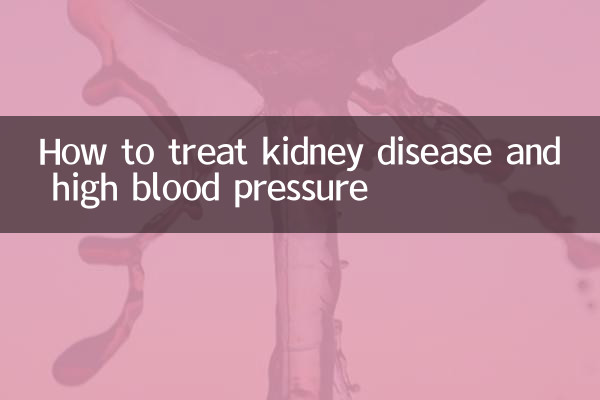How to treat kidney disease and high blood pressure
In recent years, the incidence of kidney disease and hypertension has increased year by year, becoming one of the important diseases threatening public health. Renal hypertension refers to high blood pressure caused by kidney disease, and its treatment requires comprehensive consideration of kidney function and blood pressure control. This article will combine the hot topics and hot content on the Internet in the past 10 days to give you a detailed introduction to the treatment of kidney disease and hypertension.
1. Causes and harms of kidney disease and hypertension

The causes of kidney disease and hypertension mainly include kidney diseases such as chronic nephritis, diabetic nephropathy, and polycystic kidney disease. These diseases can lead to impaired kidney function, which can lead to increased blood pressure. Long-term high blood pressure will aggravate kidney damage, forming a vicious cycle. Therefore, timely treatment of kidney disease and hypertension is crucial.
| Cause | Hazard |
|---|---|
| chronic nephritis | Leading to a gradual decline in kidney function, which may eventually develop into uremia |
| diabetic nephropathy | High blood sugar damages renal blood vessels and accelerates renal failure |
| polycystic kidney disease | Increased renal cysts compress normal renal tissue and affect renal function |
2. Treatment methods for kidney disease and hypertension
Treatment of kidney disease and high blood pressure requires a multi-faceted approach including drug treatment, lifestyle adjustments, and diet control. The following are specific treatments:
| Treatment | Specific measures |
|---|---|
| drug treatment | Using ACEI or ARB drugs, such as enalapril, losartan, etc., can both lower blood pressure and protect the kidneys |
| lifestyle adjustments | Quit smoking, limit alcohol consumption, exercise moderately, and maintain emotional stability |
| Diet control | A low-salt, low-fat, high-quality protein diet, and control the daily salt intake to 3-5 grams |
3. Dietary recommendations for kidney disease and high blood pressure
Dietary control plays an important role in the treatment of kidney disease and hypertension. Here are specific dietary recommendations:
| food category | Recommended food | taboo foods |
|---|---|---|
| protein | Eggs, milk, fish | Fatty meat, animal offal |
| vegetables | spinach, celery, cucumber | Pickled vegetables, pickles |
| fruit | apples, pears, bananas | High-potassium fruits such as oranges and grapefruits (need to be limited in cases of renal insufficiency) |
4. Daily care for kidney disease and hypertension
In addition to drug treatment and diet control, daily care is also an important part of the treatment of kidney disease and hypertension. Here are the key points for daily care:
| nursing project | Specific content |
|---|---|
| blood pressure monitoring | Measure blood pressure regularly every day, record data, and adjust treatment plans in a timely manner |
| weight management | Keep your weight within the normal range to avoid obesity and increase the burden on your kidneys |
| Regular review | Review renal function, urine routine and other indicators every 3-6 months |
5. Preventive measures for kidney disease and hypertension
The key to preventing kidney disease and hypertension lies in controlling the underlying disease and developing a healthy lifestyle. The following are specific preventive measures:
| Precautions | Specific methods |
|---|---|
| control blood sugar | Diabetic patients should strictly control blood sugar to prevent diabetic nephropathy |
| control blood pressure | Hypertensive patients should take medication regularly to avoid blood pressure fluctuations |
| healthy eating | Eat a balanced diet and avoid foods high in salt and fat |
6. Summary
Hypertension in kidney disease is a chronic disease that requires long-term management, and its treatment requires comprehensive drug therapy, dietary control, and lifestyle modification. Through scientific treatment and care, blood pressure can be effectively controlled, the deterioration of kidney function can be delayed, and the quality of life can be improved. If you or your family members suffer from kidney disease and high blood pressure, it is recommended to seek medical treatment promptly and follow the doctor's instructions for treatment.
The above content combines hot topics and hot content in the past 10 days, and I hope it can provide you with valuable reference. For further information, please consult a professional doctor.

check the details

check the details